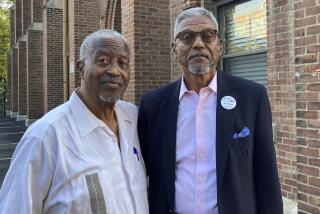After Year of Study, No Answers on Veterans’ Gulf War Syndrome
- Share via
WASHINGTON — One of the most popular explanations for the mysterious Gulf War syndrome was thrown into deeper doubt Tuesday, as a congressional panel reported there is insufficient evidence to judge whether U.S. troops were sickened by poison gas during action in the Persian Gulf in 1991.
After a year of study, investigators for the Senate Veterans Affairs Committee concluded there is not enough surviving evidence to judge whether the symptoms reported by veterans were caused by the release of nerve gas from Iraqi bunkers at Kamisiyah, Iraq.
Because of poor record keeping and the passage of time, there is no longer data “to prove or disprove that there was actual low-level exposure of any troops to chemical weapon nerve agents, or that any of the health effects some veterans experienced were caused by such exposure,” the panel wrote in its 310-page report.
In an explosive disclosure, the Pentagon announced in May 1996 that troops had been exposed to dangerous gas when U.S. engineers blew up a munitions dump at Kamisiyah, just after the close of the war. The Pentagon has repeatedly revised its estimates of how many troops might have been exposed; the latest estimates put the number at more than 110,000 of the 490,000 U.S. personnel who were in the theater during the action.
The Kamisiyah disclosure fed suspicions in some quarters--including members of the Veterans Affairs Committee--that the military had been dangerously negligent in watching out for service members’ health.
In its report, however, the committee cited flaws in the way the Pentagon and CIA estimated the dispersal of the poison gas plume that was released from the munitions depot. It faulted the Pentagon for failing to check the estimate with outside analysts, saying the poor work ultimately did “more to confuse and alarm” veterans than to help them.
In recent years, amid complaints from Gulf War vets, the government and outside researchers have launched research into the possible health effects of a variety of factors present during the war.
Still, some panel members said they are convinced nerve gas was a source of the veterans’ illnesses. “My judgment is that nerve gas is a contributing factor to Gulf War illness,” committee chairman Sen. Arlen Specter (R-Pa.) said.
More to Read
Sign up for Essential California
The most important California stories and recommendations in your inbox every morning.
You may occasionally receive promotional content from the Los Angeles Times.














